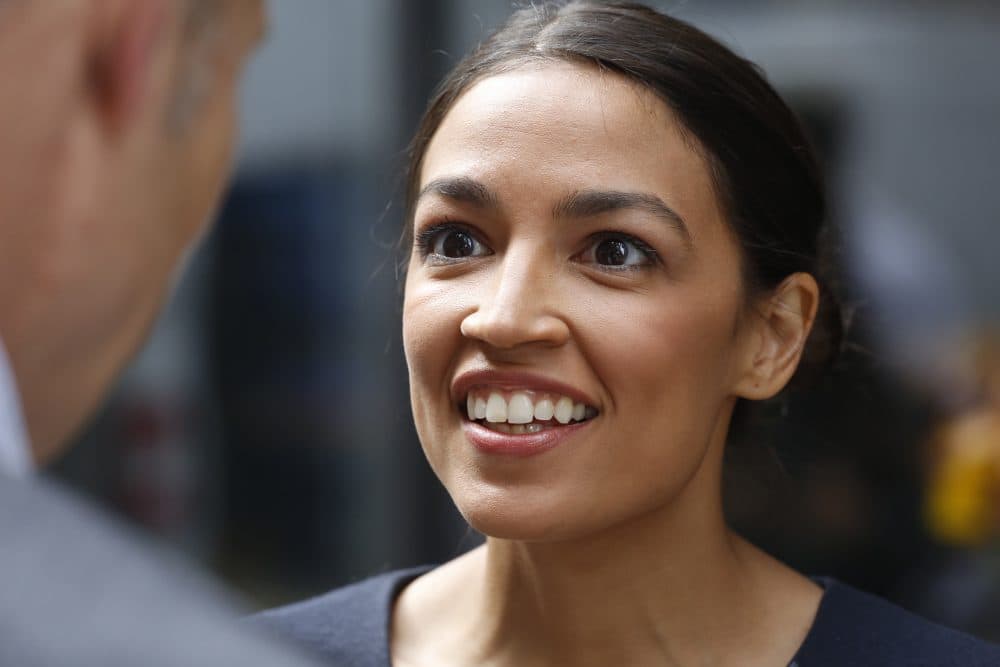Advertisement
Commentary
The Fiercest Political Fight In The U.S. Isn't Partisan — It's Generational

The most underappreciated political battle happening in America right now isn’t red and blue.
It’s generational.
Next year, the Millennial generation — young adults between the ages of 22 and 37 today — is projected to overtake the Baby Boomer generation in size. It’s a seismic changing of the guard, or at least, it should be. The U.S. government is still dominated by Boomer-age elected officials, but that’s going to change relatively soon. So the salient question to ask is this: What will the Millennials do with their political power when they start winning seats and running the show?
Last month, America got a sneak preview of what a Millennial-led Congress could look and sound like when Alexandria Ocasio-Cortez — a 28-year-old self-described democratic socialist — won a primary race against Rep. Joe Crowley in an upset that some have called shocking.
“The definition of democratic socialism to me is the fact that in a modern, moral, and wealthy society, no one should be too poor to live,” Ocasio-Cortez said to NBC’s “Meet the Press” shortly after her victory.
What will the Millennials do with their political power when they start winning seats and running the show?
This idea — while not always described as democratic socialism — has been embraced by many of Ocasio-Cortez’s peers including House candidate Cori Bush of St. Louis, gubernatorial candidate Abdul El-Sayed of Michigan, and Boston’s own Ayanna Pressley, who is challenging Rep. Mike Capuano. All of these younger candidates are running campaigns that acknowledge the failures of America’s capitalistic “free market” system that both Republicans and most Democrats are committed to upholding. Their solution? Openly populist remedies such as universal health care, a New Deal-style federal jobs program, and social housing.
So how is the Boomer political class taking all this? Not very well.
The Ocasio-Cortez victory has spooked Democratic Party figures like Nancy Pelosi, Joe Lieberman, and even Maxine Waters — each of whom has recently switched into damage control mode to assure voters that the Democratic Party brand isn’t moving too far to the left. Their trepidation is shared by many within the party, and it’s best summed up by something that Third Way President Jonathan Cowan said recently, in the wake of the Ocasio-Cortez stunner.
“The time has come to mend, but not end, capitalism for a new era,” he declared, seemingly unaware that for Millennials like Ocasio-Cortez — who’ve grown up in a climate of worsening structural wealth inequality and deadly austerity — the promise of more free market solutions doesn’t inspire much hope or confidence. This is what Millennials have been offered throughout their adult lives: even under the leadership of Barack Obama and a Democratic Congress.
Realizing the idea that Ocasio-Cortez expressed — that no person in America should be “too poor to live” — might seem radical for Baby Boomers who grew up during a time of tremendous prosperity and opportunity (for white people, at least). But today, as the Boomers begin to retire, the American Dream that Millennials were raised to work towards is floating further out of reach. Wages are stagnant, the cost of housing and healthcare is prohibitively expensive, and automation is rendering broad swaths of jobs irrelevant.
Boomers may disagree with the efficacy of the democratic socialist policies that Millennial candidates are embracing, but from a Millennial perspective, these policies are pragmatic in a way that free market solutions are not. By design, the market leaves people behind, and right now, a disproportionate number of the people getting left behind are young adults. All those stories we’ve heard about Millennials defaulting on student loan payments, moving back into their parents’ basements, and crowdfunding their treatment for life-threatening medical conditions are reflective of the Millennial experience and crucial to understanding why insurgent politicians like Alexandria Ocasio-Cortez are surging right now — even at a vulnerable moment when Democratic Party bigwigs are calling for voters to set aside intraparty differences until the midterms are done.
Nothing less than our future is at stake.
But here’s the thing about U.S. politics that both Millennials and Boomers would do well to remember: it’s not a zero sum game. Is the balance of the Democratic Party going to tilt further to the left as candidates like Ocasio-Cortez assume office? Absolutely! Are we likely to install government-run healthcare overnight? No. It’s going to take time, dialogue, and reasonable compromise to get there. We might not even get there within my lifetime (I’m 29). But as my generation earns seats at the table, that’s the direction in which we’re heading — like it or not. Because the truth on the ground is that life hasn’t gotten better for Millennials, and the current Democratic Party leadership isn’t taking our predicament seriously enough.
So, to my Democratic elders who are nervous about all the Millennial insurgents shaking up primaries with talking points that might as well be culled from Bernie Sanders’ presidential campaign platform, let me offer this suggestion: calm down and work with us. Ultimately, we believe in the same thesis that everyone should have the right to life, liberty, and justice. Our methods for ensuring that people enjoy those rights are different than yours, yes. But that doesn't mean we're incapable or uninterested in approaching the future in a collaborative and intersection fashion.
However you may feel about my generation's politics, the problems that shaped our politics aren’t going away without significant structural changes, and neither is our resolve to be the agents of that change. Nothing less than our future is at stake.
